- Home
- Harper Lin
Lattes, Ladyfingers, and Lies Page 2
Lattes, Ladyfingers, and Lies Read online
Page 2
Susan shook her head. She leaned toward the rest of the women and dropped her voice down low enough so that anyone not at the table wouldn’t be able to hear her. “They, um, used a brick to break the window. They threw it, and it hit her.” She mimed something flying through the air and hitting her in the temple. I cringed at the thought.
“When?” I asked. “When did it happen?”
“Last night. Around ten, they said.”
“Ten? Ten p.m.?” I couldn’t believe I’d heard her right. Everything on Main Street closed by nine, especially at this time of year, when we hardly had a tourist outside of the weekends. In fact, I was pretty sure Howard Jewelers closed around five or six. I wasn’t really sure, but I knew the shop was dark when I closed up the café each night.
Susan nodded.
“What was Georgina doing there at ten o’clock at night?”
She shrugged. “I can’t imagine, unless they were doing inventory or something? But then Dean would have been there. I don’t know.”
“You never told us who found her.” Apparently, Diane used that same snippy tone of voice with everyone, not just Ellen.
“Dean. The brick set off the alarm. The alarm company called Dean, and when he got there, there she was.”
“Their alarm company doesn’t call the police?” I asked. Ours did. Police first, me second.
“I guess not.”
That seemed strange. The whole point of the alarm was to call the police. What was I going to do if the café was being broken into? Call the police, of course. For as much as I paid the alarm company every month, the least they could do was save me the trouble and call the authorities themselves. That way, the police would get there faster, and I’d be spared the trauma of finding the body of one of my employees. I looked over at Sammy and imagined responding to a late-night alarm call to find her bloody on the floor. I shuddered. It would be awful.
“Poor Dean,” I said softly. Dean Howard was the Howard in Howard Jewelers. Well, his family was, anyway. The jewelry shop had been in his family for at least a couple of generations, selling engagement rings and Mother’s Day gifts and First Communion necklaces to the men and women of Cape Bay.
Dean was several years older than me, so I didn’t know him well when we were growing up, but I remembered both being intimidated by him and thinking he was impossibly cool when I’d try to go play on the playground at the park only to find him hanging out on the swings, always with a girl, and always puffing on a cigarette. Of course, that was back before it was quite so well known how bad smoking is for you, and in any case, the fact that he was breaking The Rules was probably what made him seem so cool in my childhood eyes anyway.
“Psshh,” Diane interjected. “Dean’s a hard-nose. It probably didn’t even faze him.”
“Finding one of his employees dead?” My voice came out a little louder than it should have. I glanced around the café with an embarrassed smile. Fortunately, the place had emptied out a little, so my outburst only served to disturb a few people. Sammy, though, gave me a concerned look from behind the counter. I tried to force a more natural smile but gave up and mouthed “I’ll tell you later.” She raised her eyebrows but went back to stacking dishes.
Diane shrugged. “Think what you want.”
I gritted my teeth. Diane was the one who could think what she wanted. As far as I knew, she hadn’t ever found a dead body. I had. It was one of the worst moments of my life. And that death hadn’t even been bloody. I’d thought he was asleep… until I realized he wasn’t. Diane could go fly a kite, as my grandmother would have said.
“He may still be down at the store,” Susan said. “I think he had quite a bit of cleaning up to do.”
I winced. I didn’t want to think about the cleanup Dean would have to do. “Did you talk to him?” I was curious how she had so much information when I hadn’t even heard about the break-in or Georgina’s death.
“Oh, no!” She pulled her head back like the idea was revolting. “My friend Margaret works down at the police station. We had lunch together, and she told me all about it.”
“Margaret Robbins?”
Susan nodded. Of course it was Margaret Robbins. She worked the front desk at the police department and was a known chatterbox. We’d gone to high school together, and she’d been the same way back then. If anyone would know all the details and freely share them, it would be her.
I leaned against the window and tried to process everything I’d heard. It was horrible. I admit I forgot I was intruding on my customers’ space and conversation.
The jingle of the bell over the door brought me back to my senses. A group of five walked in, dressed in business clothes and carrying laptop bags and notepads. A couple of them glanced around, first at the big table where the book clubbers were gathered, then at the opposite side of the café that only had little two-tops. They made a beeline for the two-tops. Not that I could blame them. I’d had more than one coffee shop meeting when I was working in New York, and we always sat as far away from other people as we could. It was the only way we could actually manage to get anything done without being interrupted by nosy people eavesdropping and asking questions about what we were working on or hipster types who would immediately start going on loudly about how they could never sell out and go to work for The Man like us corporate drones, which was why they worked part time for minimum wage at a big chain bookstore. I couldn’t imagine how distracting it would be to sit next to people discussing a murder.
Sammy caught my eye. I nodded and flashed her a smile. I knew she could handle a group that size with no problem, but why should she when I was there? I looked back at the book club women and smiled politely. “Is there anything else I can get you ladies?”
A couple of them shook their heads, and a couple glanced at the others before declining.
“No, we’re fine,” Diane said without looking at anyone else. I saw Ellen roll her eyes and Rhonda quickly look out the window.
“All right. Well, if I can get you anything, please let me know!” I paused as I walked past Susan’s chair. “I apologize for interrupting. But thank you for sharing the information about Georgina.” Susan gave me a weak smile and nodded. Out of the corner of my eye, I saw Diane make a face. What on earth was with that woman? I did my best to keep my expression neutral and joined Sammy behind the counter.
The business crew had pushed several of the two-tops together, dropped off their bags, and lined up at the counter. Sammy took the orders as I started filling them. Two black coffees, one hot tea, one iced tea, and one latte, ordered with a smile and a nod in my direction.
Lattes were my specialty. The method of preparation was something that had been perfected in my family over generations. My mother had started creating images in the lattes she made back in the late 1980s when latte art first became a thing, but she never really branched out beyond hearts and rosettes.
During the long hours I used to spend at the café after school when I was a teenager, though, I learned hearts and rosettes, then suns and moons and stars, rabbits, bears, flowers, scorpions, snowflakes, random patterns, and whatever else I could think of. My friends came in and started asking for more complicated designs—a beach scene, a mountain—and before long, everyone in town knew that little Franny Amaro could create some pretty amazing things in a latte. Whenever I came home from college for a break, I’d be put back to work in the café, and the locals would flock in to see what new designs I’d come up with.
Even though I’d been away for years after graduation, it hadn’t taken long after I’d gotten back to work full time at the café for people to start coming in just to get me to make them lattes. Some of them, like the business guy who’d just ordered, I didn’t even recognize, but somehow, they knew me. It was like being a kind of celebrity. Lattes were a weird thing to be known for, but I figured it was better than some of the things people were small-town famous for—the head cheerleader from twenty-five years ago, the teacher who married a for
mer student, the guy who wrecked his father’s brand-new lobster boat when he took it out drunk on prom night. I knew all of those people and had had more than one conversation that identified them that way.
“Who?” I’d ask when Sammy would refer to someone like I was supposed to know.
“Dave Sampson,” she’d repeat. “You know, the one who got drunk and wrecked his dad’s new fishing boat on prom night?”
“Oh, yeah!” I’d reply, suddenly clearly remembering Dave and the boat with the giant hole in the hull and the looks on his parents’ faces as they took custody of him from the Coast Guard. Even though Dave was now a married father of four with a successful law practice in Boston, to the citizens of Cape Bay, he would always be known for the boat wreck. Compared to that, I was quite happy to be known for my milk-pouring skills.
I prepared each of the basic drinks—the black coffees and the teas—and set them on a tray as Sammy pulled the food—one cupcake, one tiramisu to share, and one mozzarella-tomato-basil sandwich—they’d ordered out of the display case. The man who’d ordered the latte lingered near the register when I started pulling his espresso shot. That wasn’t really unusual. Plenty of people were as interested in the process of creating latte art as they were by the end product.
“Anything in particular you’d like?” I asked as I steamed the milk.
He shrugged and smiled. “Whatever you feel like making.”
I nodded. I loved having creative freedom, but it was always a little anxiety inducing when the person knew my work but I didn’t know them. I wanted to make something impressive, but I didn’t know what would impress them. Some people were astounded by a well-done circle. Others weren’t fazed unless it was competition worthy. I had no idea where on the spectrum this guy would fall, but the milk was ready, and I needed to pour. I tipped the pitcher over the cup. Two circles, one a little larger than the other. I grabbed a toothpick. Carefully, I used it to etch a ring around the bigger circle then added a series of pinpricks scattered around the cup.
He leaned across the counter. “Saturn!” he said, noticing the orb and rings. “And that’s what? Uranus? And then the stars! That’s amazing! You’re as good as I heard!”
“Thank you.” I blushed a little. I put the cup and saucer on the tray that Sammy was waiting to take over to the tables the group had pushed together. The guy lingered for an extra couple of seconds and smiled at me before walking over to the table. I wiped down the espresso machine. Sammy dropped the drinks and food off at the table and came back around the corner.
“So…” She leaned against the counter and nodded at the book clubbers, who were starting to get up. “What was that all about?”
“Let’s go in the back room.”
Chapter 3
Sammy covered her mouth with her hands. Tears filled her eyes. “Oh, my God. Georgina?”
I reached out and rubbed her shoulder.
“I can’t believe it. She was here yesterday. She sat right there at the table in the corner. She had a latte and ladyfingers. I told her how pretty her hair was.” She sniffed and looked at me. Mascara pooled under her eyes. “She’d just gotten it done. It was a really pretty red—suited her really well.”
I pictured Georgina in my mind. Red really would suit her. Her naturally brown hair had red undertones to begin with, and punching them up would have really brought out her coloring. I imagined her thick waves framing her face in a curtain of red. She’d been pretty to begin with, but I had a feeling she’d have been a stunning redhead.
Just thinking about how she would never style her hair again, never get to take advantage of her new color, made me sad. For some reason, it was always the stupid, little stuff that hit me the hardest when someone died: a new haircut that wouldn’t be enjoyed, a bag of souvenirs that would never be given to the family members eagerly awaiting them, the just-purchased bottle of perfume my mother never got to wear. Out of all the tragedies of a sudden death, those things most tore me up inside.
I grabbed Sammy and hugged her. She clung to me, burying her face in my shoulder. At least my shirt was black so the mascara stain wouldn’t show. We stood like that until we heard a tap on the storage room door. I turned around to see Rhonda leaning against the doorframe.
“Looks like you’ve got another murder to solve,” she said.
“I’m staying out of this one,” I replied. “I think the police will appreciate it.”
I’d managed to get myself involved in the investigations of three murders in Cape Bay since I’d come back to town over the summer. It wasn’t that I thought of myself as an amateur private investigator or anything like that, just that I somehow kept getting drawn into them. I’d ask one innocent question, and—boom!—I was sucked in. My curiosity wouldn’t let me let it go. I’d found some critical evidence in each case, but that didn’t mean either the police—or I—were eager for me to go doing it again.
“Ryan said you were really helpful last time though!” Sammy said.
Okay, so maybe the police didn’t mind my meddling so much. Ryan Leary was the newest addition to the Cape Bay Police Department, coming on right before the last murder we’d had back at the end of the summer. While he and Sammy would both deny there was anything going on between them, they sure seemed to spend a lot of time together.
“I’m leaving for Italy in a week. I have plenty to worry about besides solving Georgina’s murder.” I ticked off on my fingers. “What I’m going to wear over there, finalizing our itinerary, what I’m going to wear, making sure everything here at the café is in order, what I’m going to wear, making sure the dog is taken care of, what I’m going to wear.”
Rhonda and Sammy both laughed, Sammy through her tears.
“You seem a little worried about what you’re going to wear in Italy,” Rhonda said.
“Italian women are very fashionable.”
“Fran, you’re Italian, and you’re very fashionable. You’re going to look fine. Better than fine. You’re going to look great!” Sammy said.
I glanced down at my outfit: black top, black pants, black shoes—simple and boring. Fine for Cape Bay or even New York City, but I wasn’t so sure about Italy. At least the shoes were Italian leather. My mother and grandmother had always emphasized to me the importance of Italian leather. “Nothing beats the quality,” they’d told me, over and over again. Sure enough, I’d found that as long as I made sure the styles I purchased were classics, the Italian leather bags and shoes I purchased lasted forever. The shoes I had on were from college. Still, I wanted to blend in with the native Italians.
“I just don’t want to stick out as an American.”
“What’s wrong with looking like an American?” Sammy asked.
“She means she doesn’t want Matt’s eye wandering to some gorgeous young Sofia Loren look-alike.” Rhonda gave me a sly look. My cheeks turned pink.
“Matt wouldn’t do that! You’ve seen the way he looks at Fran. He only has eyes for her!” Sammy said.
Even without a mirror to look in, I knew my face was bright red. I saw Rhonda try not to laugh, and I knew she’d noticed my flushed cheeks. I was afraid of what she would say next, probably something to send me flying out the back door, too embarrassed to show my face in the café ever again.
“I could take you up to Neiman’s if you want. Little shopping trip. Just the girls,” she said instead.
“I can cover the café for you,” Sammy offered.
“Oh, no, you’re coming with us, Sammy.” Rhonda winked.
“Who’s watching the café then? I can’t leave Becky and Amanda here by themselves!” Becky and Amanda were the high school girls who worked at the café part time after school and on weekends. They were good employees, but I couldn’t quite imagine the two of them running the café on their own, even for a few hours.
“They can come too,” Rhonda said. “Team-building exercise. It won’t hurt to close the café for an afternoon.”
“They have school.”
&n
bsp; “We could go after school.”
“It would be kind of fun,” Sammy said.
I rolled my eyes. “I can’t afford anything worth buying at Neiman’s.”
“You should get a part-time job,” Rhonda said. “That’s how I afford to shop there.” Her part-time job, of course, was working for me at the café. She didn’t make enough to afford anything substantial at Neiman Marcus either. She laughed. “I’m kidding… unless you want a key chain or some sticky notes, but those probably won’t help you feel very stylish.”
“They sell sticky notes at Neiman’s?” I asked, completely thrown off by this revelation.
“Designer ones.” She shrugged. “Or we could just go to Macy’s.”
“Oh, we should! It would be really fun!” Excitement shone from Sammy’s face for a second before she sobered. “It feels wrong being happy when Georgina just died.”
I nodded in agreement. It was a strange thing when someone you knew, but weren’t close to, died. You were sad, but it wasn’t the all-consuming kind of sadness that you had when a loved one died. Instead, you cycled through feeling sad, then feeling completely normal, then feeling guilty for feeling normal, then feeling sad again. I guess it wasn’t all that different from when a loved one died, just less intense.
We stood, a little bit uncomfortable, thinking about Georgina and her heartbreaking death until the jingle of the bell over the café door jolted us out of our reverie. Rhonda turned to see who it was.
“Just Ryan.” She glanced purposefully at Sammy. A look of excitement crossed Sammy’s face, but she quickly regained her composure.
We listened to Ryan’s heavy footfalls. Between his heavy cop shoes and his duty belt laden with his various cop accessories, his walk when he was in uniform was much louder than it was when he wore civilian clothes. I’d once asked him how on earth he managed to sneak up on criminals when he was always stomping around like that. He’d just smiled and said he had skills. I had to trust him on that.

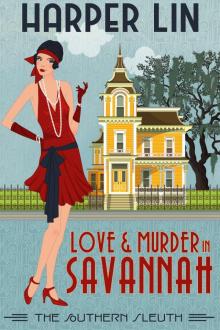 Love and Murder in Savannah
Love and Murder in Savannah Cremas, Christmas Cookies, and Crooks
Cremas, Christmas Cookies, and Crooks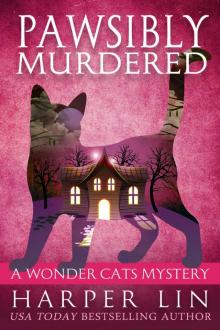 Pawsibly Murdered
Pawsibly Murdered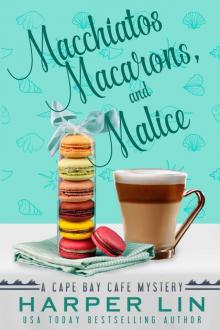 Macchiatos, Macarons, and Malice
Macchiatos, Macarons, and Malice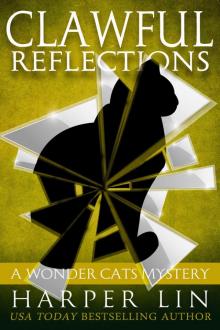 Clawful Reflections
Clawful Reflections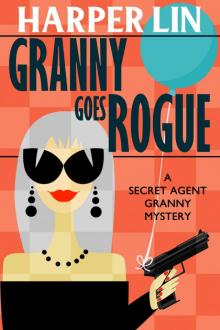 Granny Goes Rogue
Granny Goes Rogue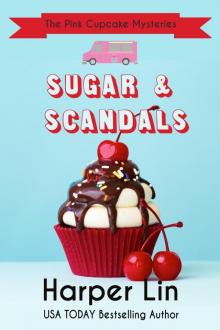 Sugar and Scandals
Sugar and Scandals Cape Bay Cafe Mystery 10 - Punch, Pastries, and Poison
Cape Bay Cafe Mystery 10 - Punch, Pastries, and Poison Desserts and Death
Desserts and Death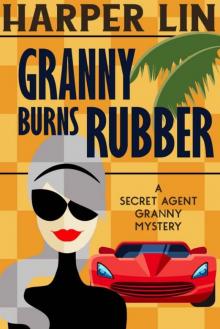 Secret Agent Granny 10 - Granny Burns Rubber
Secret Agent Granny 10 - Granny Burns Rubber Punch, Pastries, and Poison
Punch, Pastries, and Poison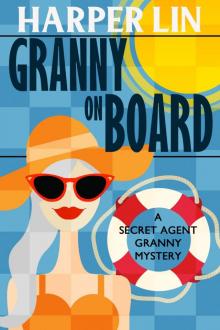 Granny on Board
Granny on Board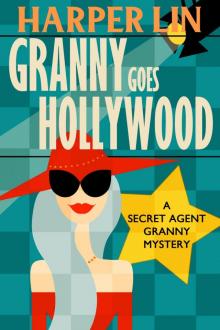 Granny Goes Hollywood
Granny Goes Hollywood Chocolat Chaud Murder
Chocolat Chaud Murder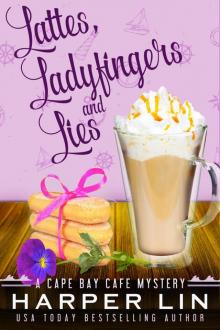 Lattes, Ladyfingers, and Lies
Lattes, Ladyfingers, and Lies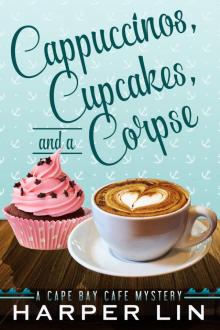 Cappuccinos, Cupcakes, and a Corpse
Cappuccinos, Cupcakes, and a Corpse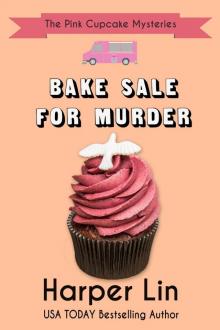 Bake Sale for Murder
Bake Sale for Murder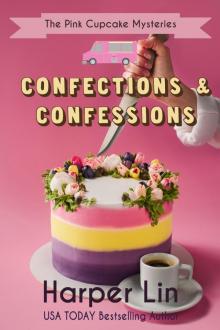 Confections and Confessions
Confections and Confessions Purr-suasive Witches (A Wonder Cats Mystery Book 11)
Purr-suasive Witches (A Wonder Cats Mystery Book 11)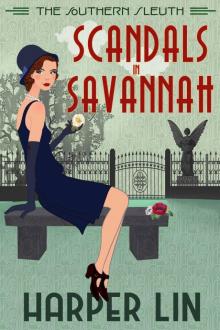 Scandals in Savannah
Scandals in Savannah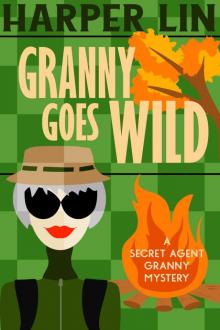 Granny Goes Wild
Granny Goes Wild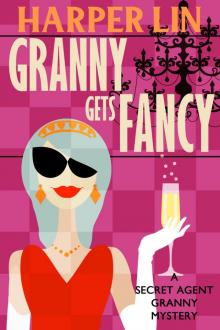 Granny Gets Fancy
Granny Gets Fancy Croissant Murder (A Patisserie Mystery with Recipes)
Croissant Murder (A Patisserie Mystery with Recipes)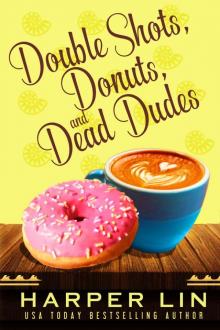 Double Shots, Donuts, and Dead Dudes
Double Shots, Donuts, and Dead Dudes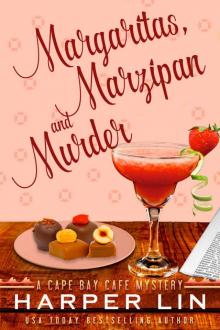 Margaritas, Marzipan, and Murder
Margaritas, Marzipan, and Murder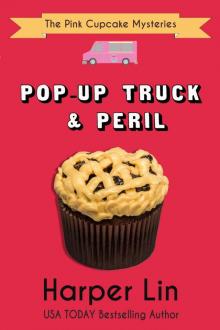 Pop-Up Truck and Peril
Pop-Up Truck and Peril Harper Lin - Patisserie 06 - Crème Brûlée Murder
Harper Lin - Patisserie 06 - Crème Brûlée Murder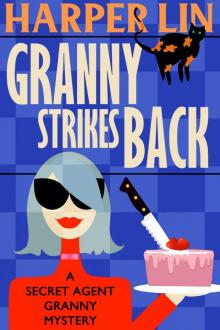 Granny Strikes Back
Granny Strikes Back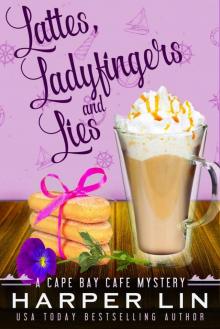 Lattes, Ladyfingers, and Lies (A Cape Bay Cafe Mystery Book 4)
Lattes, Ladyfingers, and Lies (A Cape Bay Cafe Mystery Book 4)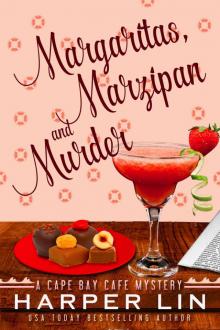 Margaritas, Marzipan, and Murder (Cape Bay Cafe 3)
Margaritas, Marzipan, and Murder (Cape Bay Cafe 3)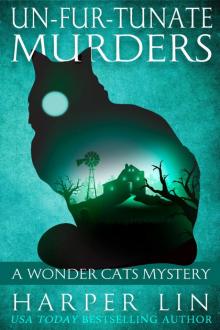 Un-fur-tunate Murders
Un-fur-tunate Murders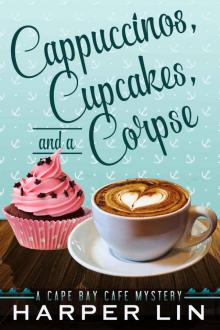 Cappuccinos, Cupcakes, and a Corpse (A Cape Bay Cafe Mystery Book 1)
Cappuccinos, Cupcakes, and a Corpse (A Cape Bay Cafe Mystery Book 1)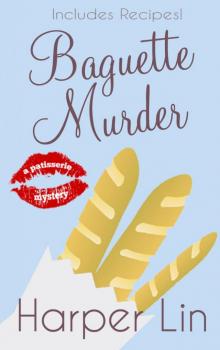 Baguette Murder: Book 3 (A Patisserie Mystery with Recipes)
Baguette Murder: Book 3 (A Patisserie Mystery with Recipes) 03 Food Festival and a Funeral
03 Food Festival and a Funeral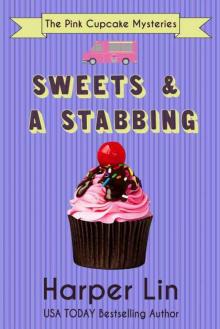 Sweets and a Stabbing (The Pink Cupcake Mysteries Book 1)
Sweets and a Stabbing (The Pink Cupcake Mysteries Book 1) A Deadly Bridal Shower (The Pink Cupcake Mysteries Book 2)
A Deadly Bridal Shower (The Pink Cupcake Mysteries Book 2)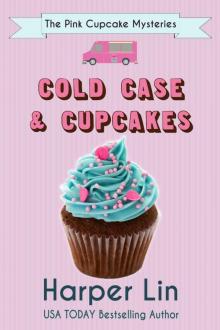 04 Cold Case and Cupcakes
04 Cold Case and Cupcakes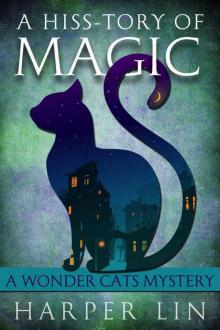 1 A Hiss-tory of Magic
1 A Hiss-tory of Magic 2 Éclair Murder
2 Éclair Murder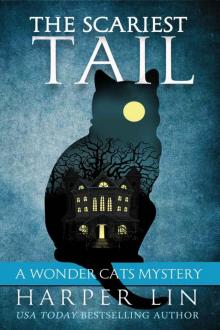 The Scariest Tail (A Wonder Cats Mystery Book 4)
The Scariest Tail (A Wonder Cats Mystery Book 4)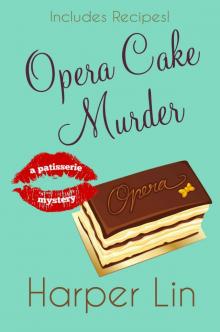 Opera Cake Murder (A Patisserie Mystery with Recipes Book 8)
Opera Cake Murder (A Patisserie Mystery with Recipes Book 8)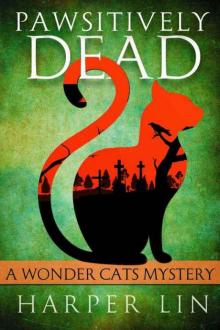 Pawsitively Dead (A Wonder Cats Mystery Book 2)
Pawsitively Dead (A Wonder Cats Mystery Book 2)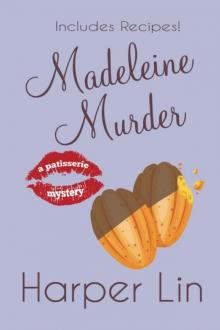 Harper Lin - Patisserie 07 - Madeleine Murder
Harper Lin - Patisserie 07 - Madeleine Murder Cat-astrophic Spells
Cat-astrophic Spells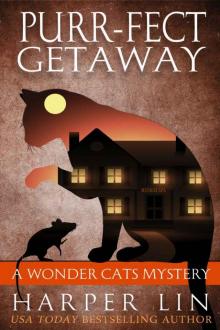 Purr-fect Getaway (A Wonder Cats Mystery Book 5)
Purr-fect Getaway (A Wonder Cats Mystery Book 5)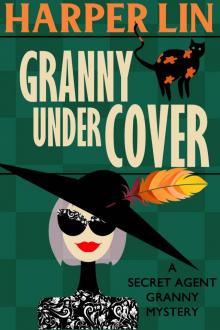 Granny Undercover (Secret Agent Granny Book 2)
Granny Undercover (Secret Agent Granny Book 2)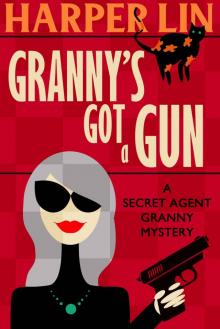 Granny's Got a Gun (Secret Agent Granny Book 1)
Granny's Got a Gun (Secret Agent Granny Book 1)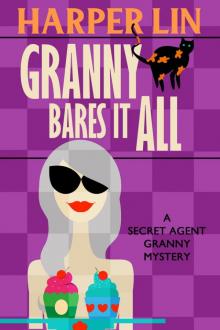 Granny Bares It All
Granny Bares It All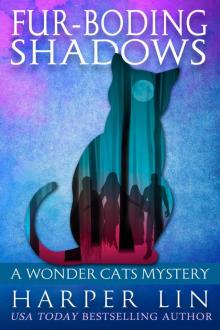 Fur-boding Shadows
Fur-boding Shadows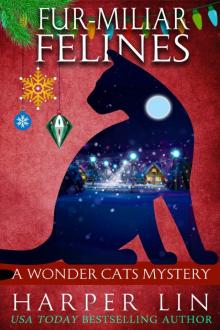 Fur-miliar Felines
Fur-miliar Felines